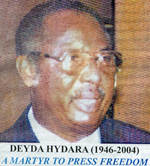I can still vividly recall how the news of Deyda Hydara’s killing was relayed to me on the morning of December 17, 2004, after I returned from a trip to Zambia the previous night. Very early that morning, I called his childhood friend and partner at The Point, Pap Saine, who told me: “They shot him dead last night.” I had to pinch myself to realize that I was not actually dreaming.
My first encounter with Deyda was in 1979 when, as a junior reporter for The Nation newspaper (published by the late William Dixon-Colley), I was arrested and detained by the police for a commentary I wrote about corruption in the police force. Deyda frequently visited me at the police station and gave me the encouragement I needed to survive the ordeal. As the then-manager of the first private commercial radio station in Africa, Radio Syd, and vice chairman of the Gambia Press Union (GPU), he not only fully supported me in my journalism career but also encouraged me to apply to be a union member. After that, he became my friend and confidante. Even when I took over as president of the GPU from him in 1998, he continued to give me invaluable counseling and advice.
Deyda was quite courageous and very passionate about defending press freedom in the Gambia, and he would go to any length to express his views on it in his popular “The Bite” column in The Point. Deyda was not only a journalist, but a human rights activist and a philanthropist who participated in various humanitarian causes, including raising funds for the mental wing of the Royal Victoria Teaching Hospital in Banjul. He was also quite a sociable person who had many friends across the social strata.
Since Deyda’s murder, Gambian authorities have not shown genuine interest in investigating his murder, leading the GPU to call for external investigators. We have watched as the Gambian government invited British investigators to help investigate certain crimes–the latest being the large haul of drugs recently uncovered in the country. We are convinced that if the same dedication had been shown to Deyda’s case, it could have been resolved long ago.
Nevertheless, while the Gambian authorities have woefully failed in their duties to bring the justice to Deyda’s case, his family, friends and colleagues are consoled by the overwhelming support and interest that his murder continues to generate, both at home and abroad. Since 2004, Deyda has received so many international awards and accolades, the latest being the “Hero of African Journalism Award” by the African Editors’ Forum, of which he was a founding member.
Rather than continuing to treat this case as a non-event, Gambian authorities should assume their responsibility of investigating who killed Deyda and why. That is what all decent Gambians and the international community expect of them, and nothing less.
